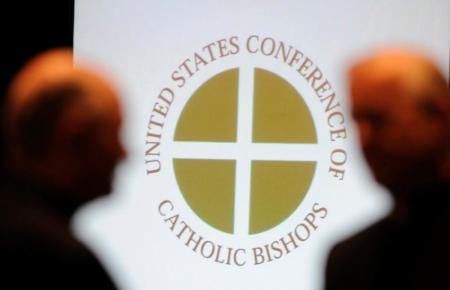USCCB considering ‘teaching document’ urging Catholic politicians to ‘embody church teaching’

U.S. Catholic Bishops are expected to vote this week on a proposed document focused on the meaning of communion. While they are not likely to prohibit pro-abortion politicians from receiving the Eucharist, a draft document calls for Catholic public servants to “embody Church teaching.”
The U.S. Conference of Catholic Bishops is meeting in Baltimore Monday through Thursday. The bishops are expected to vote on a proposed “teaching document” about the sacrament of communion, according to The Associated Press. The document was drafted by the conference’s Committee on Doctrine after a June meeting.
A week after the draft “Document on the Meaning of the Eucharist in the Life of the Church” was approved, the USCCB clarified that the document would not lead to a blanket prohibition on pro-abortion politicians receiving communion.
Following the election of President Joe Biden, much debate has been had this year among American Catholics on whether communion should be denied to politicians who support abortion. The Catholic Church has long opposed the practice. The Church’s Code of Canon Law states that those “obstinately persevering in manifest grave sin are not to be admitted to Holy Communion.”
Supporters of denying communion cite a 2004 letter from then-Cardinal Joseph Ratzinger, who would later become Pope Benedict XVI, to two high-ranking officials in the U.S. Catholic Church. The letter expressed that “the Church teaches that abortion or euthanasia is a grave sin.”
Although the draft the bishops will consider this week mentions the term “abortion” only once, it states that “Lay people who exercise some form of public authority have a special responsibility to embody Church teaching.”
“[Biden has] gone on record as saying abortion is a fundamental right while presenting himself as an exemplary Catholic,” doctrine committee member Bishop Michael Olson of Fort Worth, Texas, was quoted as saying by AP. “The issue of public confusion is really at stake here.”
However, Olson and his colleagues determined that the draft document should avoid any hints of partisan politics, Olson told AP.
The document was initially characterized as a rebuke to pro-abortion Catholic politicians, but later the USCCB emphasized that “the question of whether or not to deny any individual or groups Holy Communion was not on the ballot.”
According to a question-and-answer document about the vote published by the USCCB, the document “is not meant to be disciplinary in nature, nor is it targeted at any one individual or class of persons.”
“It will include a section on the Church’s teaching on the responsibility of every Catholic, including bishops, to live in accordance with the truth, goodness and beauty of the Eucharist we celebrate,” the USCCB clarified.
Late last month, Biden received communion at St. Patrick’s Church in Rome, where he was taking part in the G20 summit.
Biden is the second Catholic to become president of the United States. He has drawn ire from some within the church who feel his policies and support for codifying abortion rights into federal law contradict the Catholic Church’s teaching against abortion. Biden is not the only Catholic to hold a prominent national political position as Democratic Speaker of the House Nancy Pelosi is also Catholic.
Biden has maintained that he personally opposes abortion but doesn’t think he should impose his views on others as an elected official.
In 2019, Biden was denied communion by a South Carolina priest while campaigning for the 2020 presidential election.
In October, a prominent Vatican official told AXIOS on HBO that Biden shouldn’t be prevented from receiving the Eucharist, saying the “Eucharist should not in any way become a weapon.”
Biden met privately with Pope Francis at the Vatican last month and said afterward that the pope had told him he was a “good Catholic” who can receive communion.
Before that meeting, Pope Francis, whose liberal theology has ruffled many conservative Catholics since his election in 2013, appeared to criticize U.S. bishops for dealing with the issue in a political rather than a pastoral way.
Last month when Pope Francis was asked about the U.S. communion debate, he called abortion, even soon after conception, “murder.” However, he added that “communion is not a prize for the perfect. … Communion is a gift, the presence of Jesus and his Church,” according to Reuters.





















